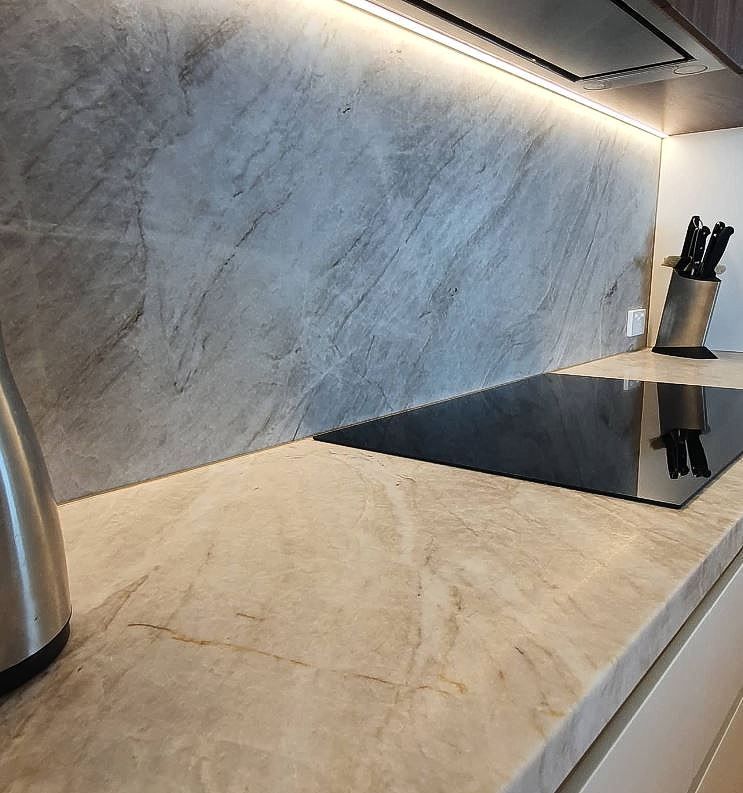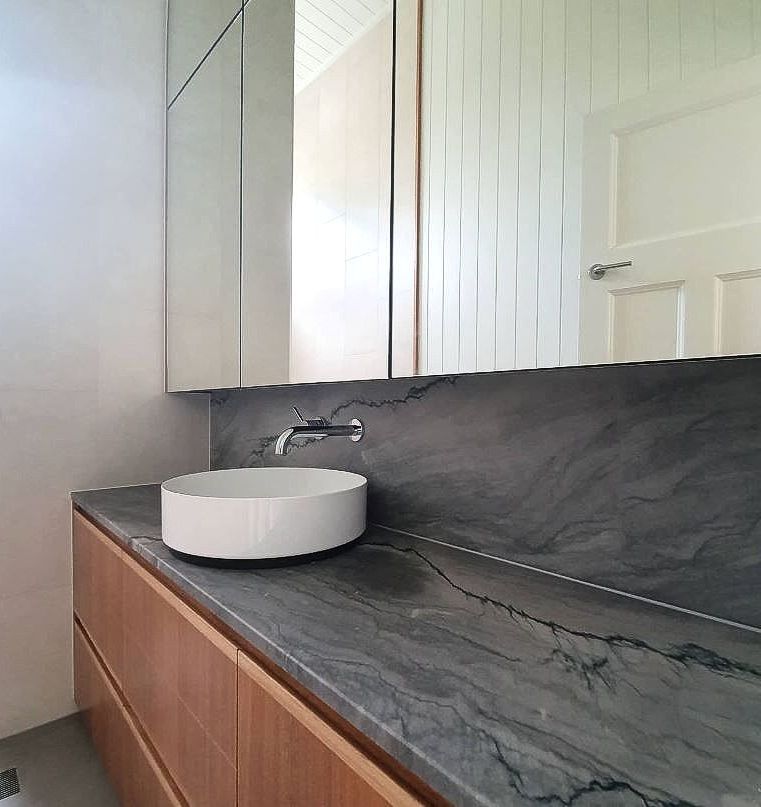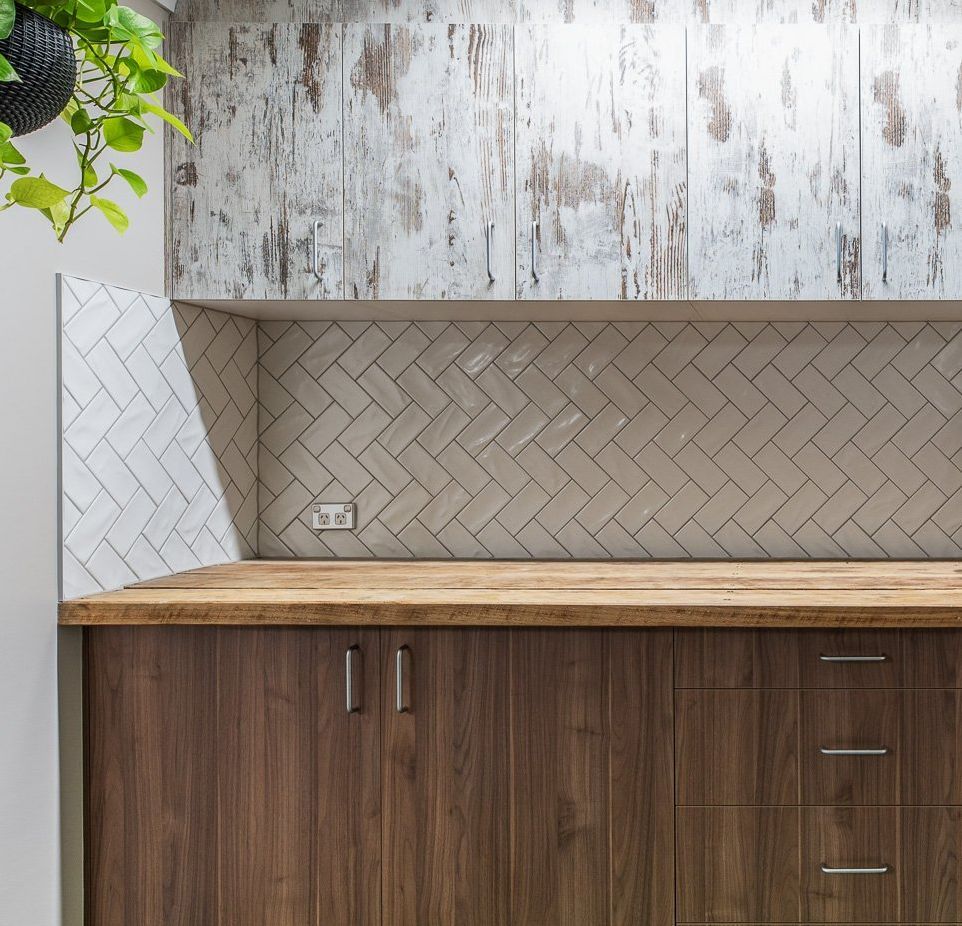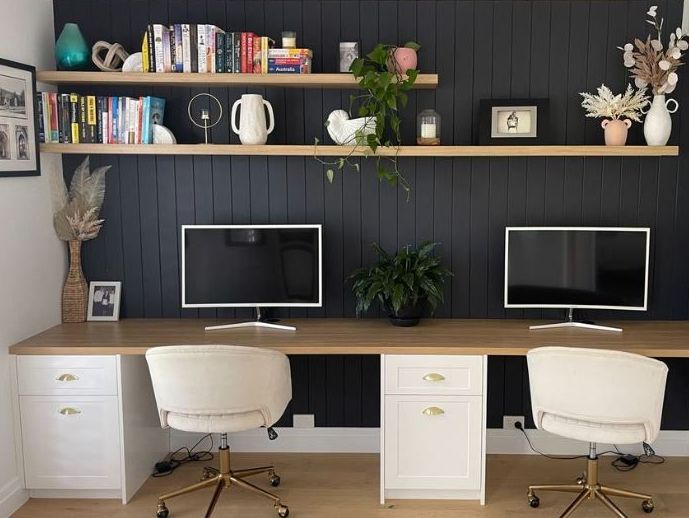Stone vs Laminate Benchtops
Which is the best choice for you ?
Your benchtop serves as a cornerstone of your home, playing a pivotal role in both your kitchen and bathroom aesthetics and functionality. With its prominent placement and frequent use, selecting the ideal benchtop material becomes a significant decision. The options are abundant, ranging from luxurious stone varieties to versatile laminates, each offering distinct advantages and drawbacks. Delving into this choice involves weighing a multitude of factors, from durability and maintenance requirements to cost-effectiveness and design preferences. Ultimately, navigating through the myriad of options necessitates a thorough examination of the pros and cons to pinpoint the perfect fit for your home's unique style and practical needs.


Stone
Pros
Stone benchtops offer a multitude of advantages that make them a popular choice for homeowners seeking both functionality and aesthetic appeal:
1. Durability: Stone benchtops, whether made from granite, marble, quartz, or other natural stones, are exceptionally durable and resilient to everyday wear and tear. They can withstand scratches, heat, and impacts, making them suitable for high-traffic areas like kitchens.
2. Timeless Aesthetic: The natural beauty and elegance of stone lend a timeless appeal to any space. With unique patterns, colors, and textures, stone benchtops add character and sophistication to your kitchen or bathroom, enhancing the overall ambiance of the room.
3. Variety of Options: Stone benchtops come in a wide range of options, allowing homeowners to choose the perfect stone that complements their design preferences and existing décor. Whether you prefer the bold veining of marble, the speckled patterns of granite, or the uniformity of quartz, there's a stone to suit every style.
4. Increased Home Value: The luxurious appearance and durability of stone benchtops can enhance the resale value of your home. Potential buyers often view stone surfaces as premium features, making them a desirable selling point for future real estate transactions.
5. Heat Resistance: Stone benchtops are highly heat-resistant, meaning they can withstand hot pots, pans, and appliances without being damaged. This makes them a practical choice for cooking areas where heat exposure is common.
6. Low Maintenance: While some stones may require periodic sealing to maintain their integrity, overall, stone benchtops are relatively low maintenance. They are easy to clean and sanitize, requiring only mild soap and water for routine maintenance.
7. Longevity: With proper care and maintenance, stone benchtops can last a lifetime. Their durable nature means they are less likely to chip, crack, or stain compared to other materials, providing long-term value and peace of mind for homeowners.
Cons
While stone benchtops offer numerous advantages, they also come with a few potential drawbacks that homeowners should consider:
1. Cost: One of the most significant drawbacks of stone benchtops is their high initial cost. Compared to other materials like laminate or wood, stone benchtops can be considerably more expensive to purchase and install. This upfront investment may deter some homeowners, especially those working within a tight budget.
2. Weight: Stone benchtops are heavy, which can pose challenges during installation and may require additional structural support. The weight of the stone can also make it difficult to transport and maneuver, potentially increasing installation costs and logistical issues.
3. Porosity: While some types of stone are naturally more resistant to stains and moisture, others, such as marble, can be porous and susceptible to staining if not properly sealed and maintained. This porosity can also make stone benchtops more prone to harboring bacteria and mold if not adequately cleaned and sealed.
4. Maintenance: Despite their durability, stone benchtops require regular maintenance to keep them looking their best. Depending on the type of stone, this may include periodic sealing to protect against stains and moisture penetration. Additionally, certain cleaning products and techniques may be required to avoid damaging the stone surface.
5. Susceptibility to Damage: While stone benchtops are generally resistant to scratches and heat, they are not entirely impervious to damage. Heavy impacts or dropping heavy objects onto the surface can cause chipping or cracking, requiring professional repair or replacement.
6. Limited Availability: Certain types of stone, such as rare or exotic varieties, may be less readily available and more expensive to source. This limited availability can restrict design options and may increase costs for homeowners seeking specific types of stone for their benchtops.
Laminate
Pros
Laminate benchtops offer several advantages that make them a popular choice for homeowners:
1. Affordability: Perhaps the most significant advantage of laminate benchtops is their affordability. They are typically much cheaper to purchase and install compared to natural stone or solid surface options, making them an attractive choice for those on a budget.
2. Variety of Designs: Laminate benchtops come in a wide range of designs, colors, and patterns, offering versatility and flexibility in matching various kitchen or bathroom aesthetics. From replicating the look of natural stone to modern and vibrant designs, there's a laminate option to suit every style preference.
3. Easy Installation: Laminate benchtops are relatively easy to install, which can save both time and money during the renovation process. They can often be installed over existing surfaces, minimizing the need for extensive preparation work.
4. Low Maintenance: Laminate benchtops are generally easy to clean and maintain. Their smooth surface is resistant to stains and water damage, and they can be wiped clean with a mild detergent and water. Additionally, laminate is non-porous, making it less susceptible to bacterial growth.
5. Durability: While laminate may not be as durable as natural stone or solid surface materials, modern laminate benchtops are still quite resilient to everyday wear and tear. They can withstand normal kitchen activities such as chopping, slicing, and food preparation without easily scratching or chipping.
6. Resistance to Heat: Laminate benchtops have decent heat resistance, meaning they can tolerate moderate heat from pots, pans, and dishes. However, it's still advisable to use trivets or hot pads to protect the surface from prolonged exposure to high temperatures.
7. Repairability: In the event of damage, such as scratches or chips, laminate benchtops can be repaired more easily and affordably compared to natural stone or solid surface materials. This can extend the lifespan of the benchtop and maintain its appearance over time.
Cons
While laminate benchtops offer affordability and versatility, they also come with some drawbacks that homeowners should consider:
1. Prone to Damage: Despite being durable, laminate benchtops are susceptible to scratches, dents, and chipping, especially in high-traffic areas or with heavy use. Sharp objects or abrasive cleaners can easily damage the surface, detracting from its appearance and longevity.
2. Heat Sensitivity: Laminate benchtops are not as heat-resistant as other materials like stone or solid surface options. Placing hot pots, pans, or appliances directly onto the laminate surface can cause burns or discoloration, necessitating the use of trivets or hot pads to protect the benchtop.
3. Limited Repair Options: Unlike stone or solid surface materials, repairing damage to laminate benchtops can be challenging. While minor scratches or chips may be repairable with special kits or techniques, more extensive damage may require replacement of the entire benchtop, leading to additional expenses.
4. Water Damage Risk: While laminate benchtops are generally water-resistant, prolonged exposure to moisture or standing water can cause the material to swell, warp, or delaminate. This risk of water damage is particularly relevant near sinks or in areas prone to spills, requiring diligent maintenance to prevent deterioration.
5. Susceptibility to Staining: Some types of laminate may be prone to staining from certain foods, beverages, or chemicals. While newer laminate formulations may offer improved stain resistance, older or lower-quality laminates may be more susceptible to discoloration, requiring regular cleaning and maintenance to preserve their appearance.
6.
Limited Design Options: While laminate benchtops offer a wide range of colors and patterns, they may not always provide the same level of aesthetic appeal or customization options as natural stone or solid surface materials. Homeowners seeking a high-end or unique look may find their design choices limited with laminate benchtops.


Verdict
In the eternal debate between stone and laminate benchtops, the choice ultimately boils down to your priorities and budget. Stone benchtops exude timeless elegance and durability, making them a perfect fit for those who value longevity and are willing to invest in premium quality. While they come with a higher price tag, their low maintenance requirements and enduring beauty justify the investment for those who seek luxury that lasts a lifetime.
On the other hand, laminate benchtops offer a budget-friendly alternative with a wide range of design options, including convincing imitations of stone. Ideal for those looking to achieve a stylish aesthetic without breaking the bank, laminate benchtops provide practicality and versatility. However, they may not match the high-end quality and durability of stone, and their lifespan may be shorter.
In the end, whether you opt for stone or laminate depends on your preferences, lifestyle, and budget. Stone benchtops embody luxury and longevity, while laminate benchtops offer affordability and versatility. It's a matter of weighing the pros and cons to determine which option best suits your needs and complements your space.
Still unsure ? Let us know during your Site Check and Measure and we can also quote the works for you in both Laminate AND Stone!
MENU
GET IN TOUCH
(07) 3359 8188
info@craftedcabinets.com.au
Shed 07 3359 8188 Araluen Street
Kedron QLD 4031
BUSINESS HOURS
Monday - Thursday
7:00 am - 3:30 pm
Friday
7:00 am - 1:30 pm
Saturday - Sunday
Closed
REQUEST A QUOTE